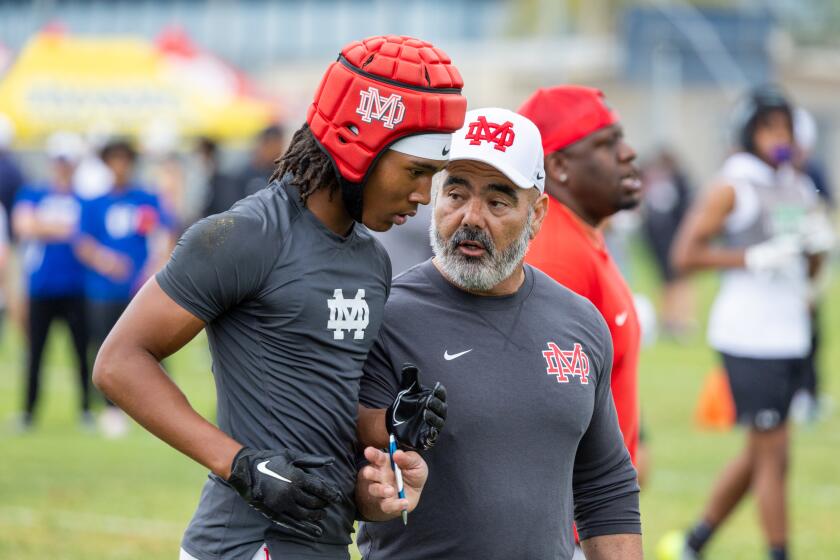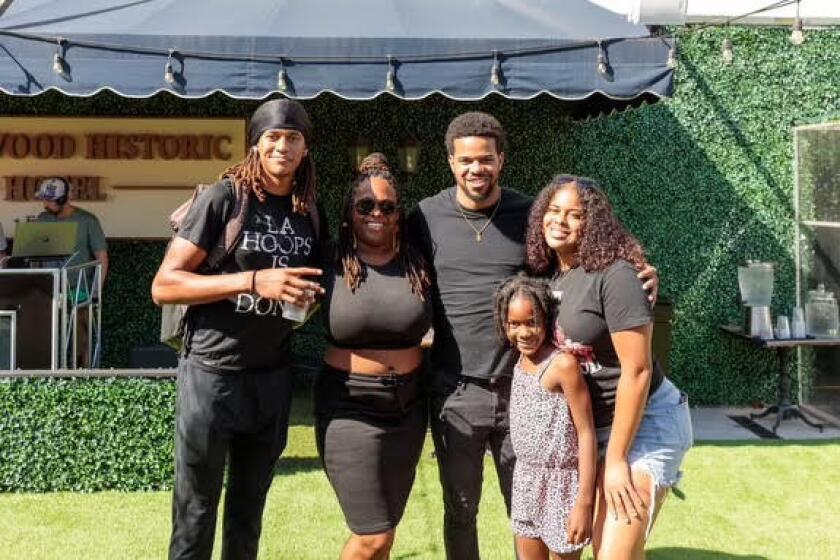Off Streets and on to Center Court, Instructor Serves Hope to Youth
Forehand smashes and overhand volleys filled the air with bright yellow tennis balls on a gray morning at DeForest Park in North Long Beach. It was too early for all but a few joggers and stray dogs, yet instructor Michael Jenkins was working up a sweat with a small group of players on one of the park’s four courts.
“Caught you sleeping,” Jenkins said with a big smile when one of the players failed to return a volley. “Be ready. Be ready.”
Jenkins, a southpaw, reached into a basket of tennis balls, then sent a crisp shot over the net. The 38-year-old from San Pedro is taking tennis into inner-city parks, where Michael Jordan is a hero and Pete Sampras is an unknown. He oversees junior tennis programs at 15 sites from Santa Monica to Long Beach, and teaches the sport for the city of Long Beach. He often gives free classes to underprivileged youngsters.
A year ago he was instrumental in starting the first tennis class in the crime-ridden Carmelitos housing project in North Long Beach. In November, the National Junior Tennis League honored him for his efforts.
“He’s a real trouble-shooter for us,” said Arlene Barco, assistant director of the tennis league. “Sometimes it’s hard for us to go into these areas, but he goes in and clears things up. He’s done a lot of good things to get kids off the streets.”
Jenkins, who grew up in a broken home in Grand Rapids, Mich., knows the streets. He walked them when he wasn’t playing youth baseball. He discovered tennis at age 9. Kids in the neighborhood told him it was “a sissy sport” and harangued him until he quit playing at 14. Fearing for his survival, he took up boxing.
“I was a pretty tough guy,” he said. “I had to be. I got tired of being beaten up every day coming home from school.”
When he was 16, Jenkins moved to California to live with an uncle. He attended Banning High in 1972-73 and later Harbor College and Cal State Dominguez Hills, where he picked up tennis again.
Four years ago, after a streak of bad luck, Jenkins was on the streets again, sleeping in a car. Jobs as a male exotic dancer and recreation assistant had dried up. At night he parked a weathered Ford Granada behind the pool at Peck Park in San Pedro. He gave a few tennis lessons and scrounged up old rackets, which he exchanged with manufacturers for new or repaired ones.
“I would either give the racket to the kids I was teaching, or sell them for my next meal,” he said.
He was befriended by Paul Anderson, a senior pastor at Trinity Lutheran Church in San Pedro, who offered to help him find lodging and another car. The two played tennis often at Peck Park and Anderson asked Jenkins to teach his son.
“Michael was up and down,” Anderson said. “When he taught tennis he was very patient with the kids. I appreciated that. But he wasn’t stable (in other actions). Maybe in the background he came from he wasn’t taught the stability you need in life.”
One night in the spring of 1990, while in his car in the park, Jenkins was approached by a police officer. The vehicle was unregistered and Jenkins had no driver’s license or auto insurance. But Jenkins said the officer did not detain him. The next night he returned and asked Jenkins to teach his two children to play tennis. Jenkins saw the break as an omen.
“That very night is when my life turned around,” he said.
Shortly thereafter, a friend helped get some money together to pay for Jenkins to attend a five-day tennis academy in Palm Springs, where he received certification as a teaching professional. Work with the Junior Tennis League began to pick up and in the fall of 1990 the parent of one of Jenkins’ students told him that Long Beach needed a tennis teacher for classes at Silverado, Veterans and DeForest parks.
His experience with the U.S. National Junior Tennis League helped him get the job.
“I’ve always found him to be a very professional person,” said Long Beach Parks Supt. Helene Cummings. “He often gives free lessons and he’s very interested in kids.”
Barco, the junior league official, said that Jenkins has come a long way. She recalls the first time she met him seven years ago.
“My first impression was, ‘Oh, my God!’ ” she said. “He had this earring and he was a very aggressive guy.”
The earring, according to Jenkins, helps open doors in inner-city neighborhoods where no tennis pro has gone before.
“Gangs are very territorial,” he said, pointing to his earring, which is considered fashionable among black men in the inner city. “If they see a new face in the park they want to make sure who you are, that you’re not selling drugs on their turf. This earring has saved my butt a few times because it’s the kind of thing they respect.”
Barco said Jenkins has dealt with all sorts of distractions while doing his job. A bullet was once fired near the tennis courts at Scherer Park in Long Beach. In Inglewood, Jenkins was stopped by gang members because he was wearing a sweat suit with the wrong colors. At Carmelitos, he was the target of racial slurs by other blacks. On the first day of classes, seven tennis rackets supplied by the Junior League were stolen.
“That was rough,” he said. “They didn’t like me because I wouldn’t let them take the equipment and do what they wanted with it. I made sure the classes ran on time and they had to be there to use the equipment.”
Basketball has become the sport of choice in the inner city, but tennis could be big if more courts are made available, Jenkins said.
“In the parks there are zillions of kids who want to play tennis, but in most cases the parks just don’t have tennis available to them,” he said. “If I go into an area and get two kids playing the game, well, I really feel good about that.”
Sean Lindy, a teen-ager from Illinois who is visiting his father in Long Beach, takes the class at DeForest Park.
“I like him,” Lindy said of Jenkins. “I’ve had a lot of boring instructors. He’s not so serious and he tries to make it fun.”
Jenkins sees himself as a role model, particularly at inner-city parks.
“A lot of people have helped me through my career,” he said. “This is just my way of giving some of that back.”
Get our high school sports newsletter
Prep Rally is devoted to the SoCal high school sports experience, bringing you scores, stories and a behind-the-scenes look at what makes prep sports so popular.
You may occasionally receive promotional content from the Los Angeles Times.



